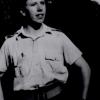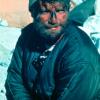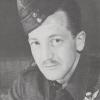This is an extract from the book 'Men of the Red Beret' (1990), Hutchison, ISBN 0-09-173931-4.
Reproduced by the kind permission of the author Max Arthur.
For the drop into the south of France I was the 2 i/c of B Company the 6th Battalion. During the night of 14 October the whole force was taken over to France by American Army Air Force. We had no doubts about the Americans' expertise as pilots, but because of Sicily had good reason to have doubts about their skill as navigators.
When we were within 30 minutes of dropping zone everyone stood up and began to make ready. I was, by arrangement, the last to go out as I had to make sure that the containers got away. We'd had trouble with this in the past — and it was very important for us that they should be released. The red light came on then the green. As I got to the door I threw the container switches but one jammed and I had to fiddle around with it. The crew chief, I think, for a moment thought that I was going to refuse and made an encouraging remark. I got the switch up and just had time to shoot him a furious glance before I jumped out. As I did so I saw below me what was, to all appearances, the sea and I was seriously concerned about this grey shimmering mass some way below me, to the point that I got out the mouth-piece of my inflatable life jacket. However, it proved to be a layer of low cloud. I was scarcely through that by more than four or five seconds when I hit the ground. Due to the switch jamming, I was some way beyond the end of my stick when I landed. I removed my parachute, got my weapon ready and using a compass began moving in the direction of our objective.
I came across a lot of French people standing outside a farmhouse and I made them a speech in my best French telling them that the day of liberation had arrived and how splendid it was for them, etc. There was no answer and then one of the women nudged one of the men and said in French, 'Tell him to shove off!' There had been a lot of noise of aeroplane engines, which was what had brought them out — and they thought we were SAS or whatever, and they didn't want to be involved. This incident brought me very rapidly to realize that the French were not all 100 per cent ready to take up arms themselves.
I pushed on and shortly after dawn a shot passed my head. I took evasive action and found I was alongside a German ammunition depot. I then spent quite a bit of time dodging a party sent out to track me down. I made no valiant attempt to stand against them, but after evading tactics came upon an American airborne unit. Shortly after, I found B Company who had been dropped accurately: the American navigators were spot on that day and dropped us well. However, George Seal, our intelligence officer, had been questioned about a lake in the vicinity of our drop during our briefing. He assured us that it was not a problem as there was no water in it. Unlucky man, he fell in it right up to his neck in water.
We then engaged in some skirmishing against the Germans who were pulling back fairly fast, and that was that. The American Airborne Force remained for a time, but the 36th and 45th American Divisions came ashore and took on the pursuit of the Germans, pushing them up from the south.
It's been said that the operation was a waste of time — possibly. The one thing it did was to liberate that area, and provide the Allies with airfields and territory of use to operations in the north.
Source:
Max Arthur
Read More




Latest Comments
There are currently no comments for this content.
Add Comment
In order to add comments you must be registered with ParaData.
If you are currently a ParaData member please login.
If you are not currently a ParaData member but wish to get involved please register.